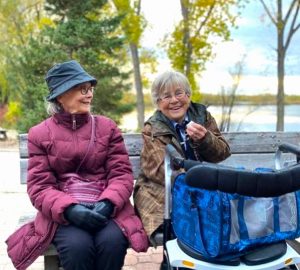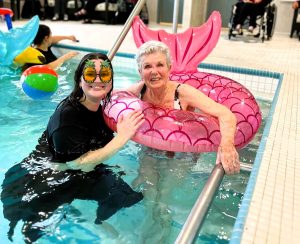
The transition to winter is a whirlwind of seasonal signs: the dusting of morning frost; a chill in the air that prompts us to get out our coziest sweaters; and the practice of “falling back”.
On Saturday, Nov. 4 Canadians in most provinces will turn their clocks back one hour before going to bed. While many people are looking forward to clocks rolling back in the wee morning hours of Nov. 5, for people with dementia, this time of year can be particularly challenging.
How the Changing Seasons Impacts People with Dementia
 It’s not unusual for seasonal changes to cause depression or the blues, but for people experiencing cognitive decline, the effects are much more marked. Less daylight and the resulting change in routine can be disturbing to a person with dementia and the transition that comes with a time change is particularly impactful. You may see an increase in:
It’s not unusual for seasonal changes to cause depression or the blues, but for people experiencing cognitive decline, the effects are much more marked. Less daylight and the resulting change in routine can be disturbing to a person with dementia and the transition that comes with a time change is particularly impactful. You may see an increase in:
- Demands
- Confusion
- Sleep disturbance
- Depression
- Restlessness, agitation, irritability
- Wandering
The most common manifestation of daylight saving among men and women experiencing dementia is an increase in ‘sundowning’, a term used to describe the onset of confusion and agitation that typically occurs in the late afternoon and evening. Sundowning is tied to the circadian rhythms, and the cycle of the sun, not the clock. And as we usher in the colder months, sundowning can get worse. So what can you do to help your loved one navigate the change?
Tips To Help Navigate Fall’s Time Change
 Dementia affects a person’s ability to understand change. This means that they may not comprehend why it’s suddenly dark at dinnertime, or why they’re so tired before bedtime. As caregivers, there are several strategies you can employ to help ease the effects of the time change on your loved ones with dementia.
Dementia affects a person’s ability to understand change. This means that they may not comprehend why it’s suddenly dark at dinnertime, or why they’re so tired before bedtime. As caregivers, there are several strategies you can employ to help ease the effects of the time change on your loved ones with dementia.
1. Ease into Change
One approach is to prepare in advance by gradually adjusting bedtimes and wake-up times. Shift the time by 15 minutes every few days leading up to the change. By slowly easing into the transition, your loved one will be better able to adjust their internal clock.
Once the time change has happened, it might take a few days to fully adjust. Your entire schedule is shifting by an hour, and many people take a week or weeks to adjust. This is completely normal.
2. Consistent Routine
Maintaining a consistent daily routine is vital. Meals, activities, and bedtime should follow a familiar pattern to provide a sense of stability. Predictable routines can serve as anchors, helping individuals with dementia feel more secure amidst the confusion that the time change may bring.
3. Maintain a Sleep Schedule
Individuals with Alzheimer’s and dementia are particularly vulnerable to sleep disturbances. These individuals often experience disrupted sleep-wake cycles due to cognitive impairments, leading to irregular sleep patterns and daytime drowsiness. The sudden change of sunrise and sunset can further disrupt their already fragile sleep patterns.
According to the Alzheimer Society, sleep plays a vital role in cognitive function and memory consolidation. Sleep disturbances can exacerbate cognitive decline, making it even more difficult for individuals to perform daily activities and maintain independence. Caregivers can help by adjusting the sleep schedule gradually, providing exposure to natural light, and creating a comfortable sleep environment.
4. Optimize Lighting
Shadows and low light can also be confusing for people with dementia . As the days get shorter, it’s important to ensure that you have enough indoor light to make your loved one feel secure. This can also help minimize the triggers for sundowning. In the morning, exposure to natural light can help reset their internal clock, while in the evening, a calm and dimly lit environment can signal that it’s time to wind down.
5. Go Outside During the Day
Natural sunlight is the best way to help regulate circadian rhythms, so spend time outdoors, particularly in the earlier part of the day. Whether taking a walk or simply sitting on the patio drinking hot apple cider, the opportunity to get outside – even if it’s cloudy – makes a big difference.
6. Encourage Physical Activity
 Regular exercise, including walking, in sessions of at least 30 minutes has been found to be beneficial for cognitive health. Helping an individual with dementia get regular physical activity can help regulate sleep patterns and reduce restlessness. A walk in the fresh air or light indoor exercises can do wonders for the person’s well-being.
Regular exercise, including walking, in sessions of at least 30 minutes has been found to be beneficial for cognitive health. Helping an individual with dementia get regular physical activity can help regulate sleep patterns and reduce restlessness. A walk in the fresh air or light indoor exercises can do wonders for the person’s well-being.
7. Create a Calming Environment
A tranquil environment can help alleviate the stress that comes with the time change. This includes soft music, a comfortable temperature, and the use of adaptive devices like clocks with large numbers to reduce anxiety about the time of day.
Plan more stimulating activities in the morning and encourage relaxing activities in the afternoon. During the evening, offer activities and things that provide a sense of calm and comfort. This could be:
- A favourite pastime
- Soft toy animals
- Familiar songs
- A nightlight or radio playing softly may help with sleep.
8. Patience and Compassion
Use redirection if needed. Redirecting your loved one’s attention is one of the best tools in your caregiver toolbox. If your loved one is becoming agitated, anxious, or exhibiting other unwanted behavior, distract them to redirect their focus and help them reach a place of comfort and calm.
Above all, patience and compassion are essential. There will be good days and bad days. Acknowledge that the change of season is tough for them, too, and offer reassurance when they feel lost or anxious.
9. Educate Yourself and Others
Understanding the intricacies of dementia will better equip you to handle the challenges that arise with the time change. Educating family members and friends can also provide a support network for you and your loved one.
10. Self-Care for Caregivers
Lastly, it’s vital for caregivers to take care of themselves. The time change can increase the caregiving burden, so ensure you’re getting enough rest, eating well, and seeking support when needed.
Where Caregivers Can Get Help with Seasonal Changes
 The transition out of Daylight Saving Time doesn’t have to be daunting. With thoughtful preparation and a toolbox of strategies, caregivers can help ease the disorientation associated with the time change and change of seasons. Remember, you are not alone on this journey. If you and your loved one lives in an All Seniors Care residence, there’s a community of caregivers and healthcare professionals ready to support you.
The transition out of Daylight Saving Time doesn’t have to be daunting. With thoughtful preparation and a toolbox of strategies, caregivers can help ease the disorientation associated with the time change and change of seasons. Remember, you are not alone on this journey. If you and your loved one lives in an All Seniors Care residence, there’s a community of caregivers and healthcare professionals ready to support you.
All Seniors Care offers memory care services and amenities like sensory rooms or secure terraces to help ease transitions and optimize wellbeing. To support seniors living with early cognitive decline, BLOSSOM Living provides structure and cognitive stimulation so that residents can live independently for longer and continue to age-in-place through all stages of dementia.
If you aren’t a resident, but are looking for a memory care in Ottawa or assisted living in Regina, Schedule a visit to find out how our dementia-friendly design aims to support seniors throughout the and at all stages of their illness.
For more about sundowning, read our blog Tips for Caregivers: Sundown Syndrome in Dementia. To see more articles about dementia, click here.